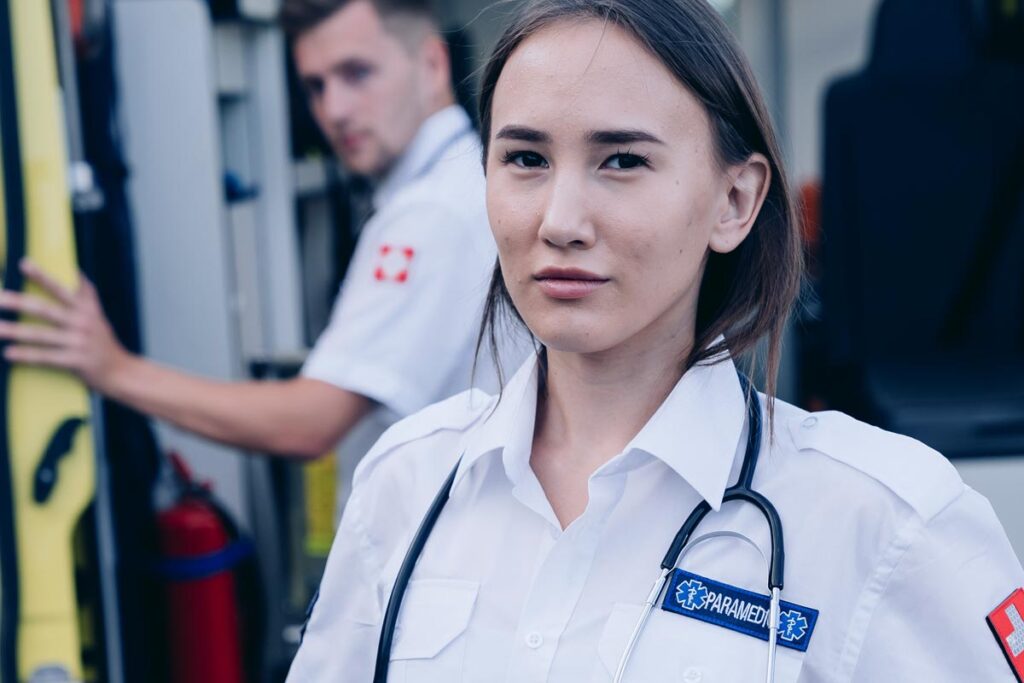
First responders, ranging from firefights to police to EMTs and surgeons, work in high stress and high trauma situations. Many of us see first responders as heroes. And, for good reason, they put their own mental and physical health on the line to keep others safe. Often, that has a toll, and many first responders eventually resort to using drugs and alcohol to ensure or enhance performance during those emergency situations, to relieve stress, and to cope with trauma and stress.
That’s further exacerbated by the fact that many emergency workers and first responders work long hours with little sleep. Most of the U.S. has a shortage of first responders, meaning that those who do work long shifts of 9-24 hours. That can combine into a stressful job in which substance abuse is common.
How Common is Substance Abuse for First Responders?
There are millions of first responders in the United States. For example, with over 1 million firefighters, almost 700,000 full-time police officers, and over 200,000 EMTs, and hundreds of thousands of other medical technicians and surgeons, nearly 1 in 100 Americans works as a first responder, in either a part or a full-time capacity. That’s crucial, considering first responders have increasingly high rates of substance abuse and substance addiction. In fact, according to a 2018 SAHMSA report, first responders in every line of duty struggle with drugs and alcohol.
Firefighters – Both career and volunteer firefighters struggle with depression, trauma, and suicidal ideation. Both also struggle with significant substance abuse. For example, 50% of male career firefighters abuse alcohol, with many binge-drinking multiple days per week. In women, that drops to 39.5%. However, it’s still significantly above the 12-15% of women in the general population who abuse alcohol. With a further 10% of total firefighters estimated to abuse mostly prescription drugs, the problem is significant.
Police – Police face increasingly high risks to alcohol and drug abuse based on time spent on the force. Police who’ve been on the force for 2 years have a 27% rate of substance abuse. After 4 years, that escalates to 39%. With so many of their peers doing it, many also report drinking to fit in and to be “one of the boys”, which further escalates the problem. While most restrict drug and alcohol abuse to prescription drugs and alcohol, those abuses can be significant.
Medical Professionals – Medical professionals including EMTs, nurses, ECAs, and adjacent professions also struggle significantly with alcohol and drug abuse. However, this problem is less studied and less reported both because medical professionals avoid sharing about drug and alcohol abuse because of fear of losing their jobs, and because first responders hold dozens of different roles depending on their state. However, with estimates suggesting 10-15% of medical professionals are addicted to drugs or alcohol, substance abuse is a serious problem in this demographic as well.
Essentially, exposure to trauma and stress affects first responders in different ways depending on how they’re exposed to that stress and trauma.
Ready to Start A New Life?
Our hands-on approach, compassionate staff, and home-like environment are here for you. Call us today.
Exposure to Trauma and Stress Increase Likelihood of Addiction
While it’s well understood that rates of alcohol and drug abuse and addiction are often as high as twice that of the general population for first responders, the reason is almost always exposure to stress and trauma.
Currently, studies show that prevalence of PTSD in first responders is shockingly high. For example, 7-19% of police officers show symptoms of PTSD. 46% of volunteer disaster recovery workers show symptoms of PTSD as well. When looking at first responders as a blanket group, most estimates suggest 6.8-7.2% meet diagnostic criteria for PTSD in a given year. That’s shockingly high compared to the general population, which averages 3.5% of U.S. adults.

In addition, first responders face extremely high exposure to stress. That’s true whether performing work as usual, where the threat of an emergency is always there. In an emergency, first responders are also required to perform to the maximum, as failure to do so can result in someone’s death or injury. That pressure has significant impacts on mental health and coping, especially in periods of trauma and in periods of failure.
First Responders Need Institutional Support
First responders are exposed to structured and repetitive trauma and stress. That stress and trauma exposure is part of the job. It’s expected, predicted, and impossible to prevent. For this reason, hospitals, police organizations, and fire departments have started providing institutional support in the form of therapy, counseling, and treatment as part of the job. This means regular diagnostic touchpoints, easily available therapy, and counseling and follow-up as part of the job.
Unfortunately, those measures are not adopted everywhere. In addition, they don’t always help or spot people with neurotic personality and avoidance coping, because those people can pretend to be fine – because that’s how they cope with things. In addition, for the many people who already have drug and alcohol abuse problems, they need more help than counseling and support designed around dealing with trauma.
At the same time, it’s a given that emergency and first responders need care built around their specific needs. Anyone who purposely undergoes long-term exposure to recurrent trauma needs ongoing and recurring counseling and support. That’s also true for those seeking out drug and alcohol addiction treatment.
Getting Help for Addiction
Long-term exposure to alcohol abuse eventually creates reliance, behavioral addiction, and chemical addiction. Drug and alcohol problems are dangerous, get in the way of relationships, career, and the ability to live a healthy life. For the millions of first responders who use drugs and alcohol to cope with exposure to extreme stress and trauma, that can be problematic.
Here, drug addiction treatment is often not enough to solve the problem. Interventions including cognitive behavioral therapy (CBT), Stepping out of a traumatic environment for 30-90 days helps and can allow you to overcome the behavioral and chemical addictions. However, you almost always need long-term follow-up and aftercare. First responders also need to take chronic exposure to stress into account and that often means adopting lifestyle and therapy options to deal with that stress in a healthy way. If you can’t do that, it may be advisable to change professions to ensure you can overcome the substance use disorder.
Eventually, first responders are exposed to significant and consistent stress and trauma. That often results in using drugs and alcohol to cope with stress and pressure. For some, especially police officers, drinking also becomes a means of fitting in. Getting help for that means approaching it from an institutional perspective, to address the underlying problems, to offer ongoing and long-term support, and to build healthy coping mechanisms for the long-term.
If you or a loved one would like more information about drug rehab, alcohol rehab, dual diagnosis rehab, or detox please contact us to speak in complete confidence with one of our experienced treatment advisors today.


